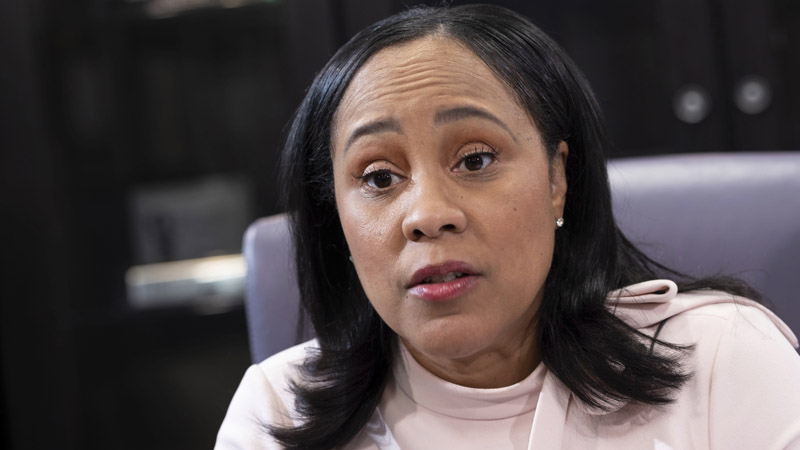Fulton County District Attorney Fani Willis has once again lost a legal battle and is now required to pay attorneys’ fees after her office was found to have intentionally violated Georgia’s open records laws.
The ruling comes as a consequence of an ancillary case tied to Willis’ failed racketeering (RICO) prosecution of President Donald Trump. In October 2024, Judge Rachel Krause signaled that Willis would be penalized for her office’s misconduct, and on Friday, the Fulton County Superior Court judge formally issued the judgment.
More: Marco Rubio & Elon Musk’s Secret Meeting Exposed—Inside Their Tense Power Struggle Over State Department Cuts
More: DHS Secretary Kristi Noem Accidentally Confirms Leak While Trying to Condemn It—Attorney Calls It a “Rookie Mistake”
“The law doesn’t apply to you,” Judge Krause remarked sarcastically during the final hearing, directing her ire at a government attorney. The case was brought by attorney Ashleigh Merchant, who represents Michael Roman, a co-defendant in the Trump RICO case. Merchant successfully proved that Willis’ office had violated the Georgia Open Records Act by deliberately delaying the release of critical documents.
These records pertained to the hiring and compensation of Nathan Wade, the former special assistant district attorney who resigned from the Trump case following revelations of his past romantic relationship with Willis. Other records in question detailed significant public expenditures by the DA’s office.
Krause explains the problem, at length:
Mr. Bond indicated that he refused to communicate by telephone with Ms. Merchant, despite testifying that his usual practice is to call a requestor to get additional information when a request is unclear. While there is no requirement under the [Open Records Act] for Mr. Bond to call any a requestor about a particular request, Mr. Bond’s handling of Ms. Merchant’s requests in this manner indicates a lack of good faith. The evidence at the hearing also demonstrated that Mr. Bond failed to produce (or meaningfully inquire about) numerous non-disclosure agreements based on his unnecessarily limited interpretation of the request as pertaining only to media agreements. After Mr. Bond consulted with Defendants’ counsel, Mr. Bond understood the request to include “confidentiality” agreements and produced 22 such agreements. Later, an office-wide e-mail was sent, and numerous other agreements were identified and produced. Mr. Bond also testified he did not conduct any searches or make other meaningful search efforts in response to Plaintiff’s request for promotional and “re-branding” materials, claiming he did not know what the request sought and there “were no searches to perform.”
Instead of complying with the law, the DA’s office stalled for months, asserting that the open records statute did not apply to them. The requested documents were only turned over after litigation was initiated and a subpoena was issued.

The case took a turn when Dexter Bond, the DA’s deputy of operations, admitted under oath that he deliberately responded unfavorably to Merchant’s requests based on the attorney’s identity. His admission did not sit well with the judge.
More: Marjorie Taylor Greene May Have Violated House Rules by Pushing FBI Probe—While Holding Tesla Stock
More: Trump’s Irish Golf Course Vandalized with Pro-Palestinian Graffiti Amid Growing Global Protests
“As noted during the hearing, Defendants — through the Open Records custodian, Dexter Bond — were openly hostile to counsel for Plaintiff, Ms. Merchant, and testified that Ms. Merchant’s requests were handled differently than other requests,” the court order stated.
Judge Krause ultimately found that Willis and her staff “acted without substantial justification” under Georgia law. “Defendants’ failures were intentional, not done in good faith, and were substantially groundless and vexatious,” Krause wrote in her ruling.
As a result, the DA’s office has been ordered to pay Merchant $54,264 in attorneys’ fees and litigation expenses. Additionally, the plaintiffs received injunctive relief, compelling Willis to release three categories of requested documents. The DA’s office has 30 days to comply with the ruling or risk further financial penalties.
For You:
- Prince Harry receives sad news after making unexpected decision
- “She’s Very Lonely” Jennifer Aniston Struggles to Find Love as Ex Moves On
- “It’s Literally a Federal Crime” Trump Slammed for Threatening to Use IRS Against Critics in Fiery Oval Office Rant
- Single Dad Lured to Fake Date and Murdered by Teen Girl’s Boyfriend
- Ben Affleck talks about Jennifer Lopez in a recent appearance

